Free California Nursing Home Abuse Attorney Case Consultation
At Senior Justice Law Firm, elder abuse claims are all we do. If you need a California nursing home abuse attorney to examine a potential case, contact us now at 888-375-9998 or submit your case facts below.
California nursing home neglect is repugnant, and unfortunately, rampant. Bed sores and broken bones are inexcusable. If you believe your loved one suffered from nursing home abuse or neglect anywhere in California, do not remain silent. Be a voice for the voiceless and contact Senior Justice Law Firm for a free California nursing home abuse attorney consultation, to learn more about your rights under California law.
Our lawyers are singularly focused on nursing home negligence cases. Call us now to see why we are different from other personal injury law firms: 888-375-9998
California Offices



Our California nursing home abuse attorney accepts cases statewide. Unable to visit one of our offices? We can do a virtual appointment, or come to you. Call us to set up a free telephone consultation at 888-375-9998. Appointments only.
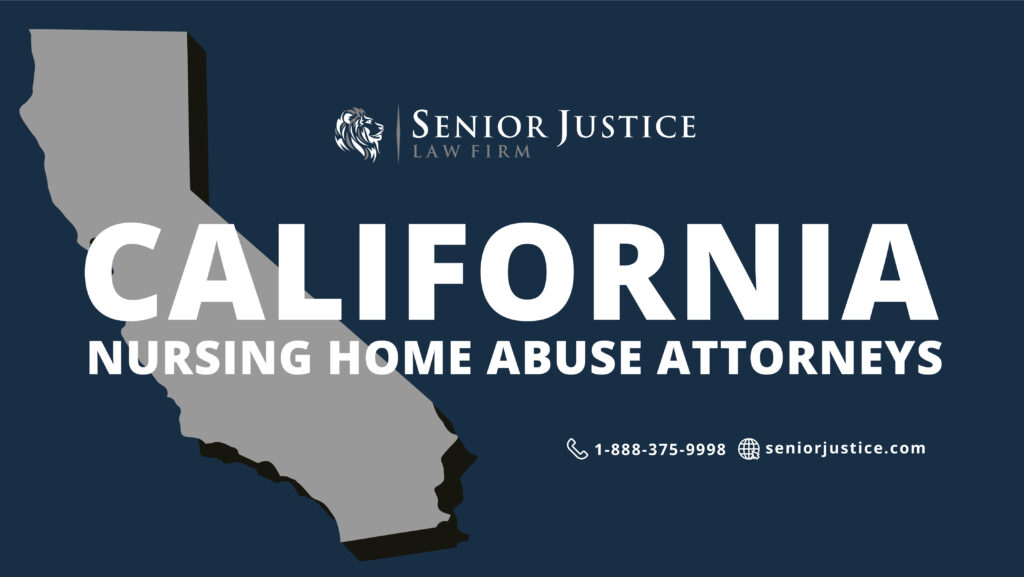
Lawyers Pursuing Justice for Nursing Home Abuse in California
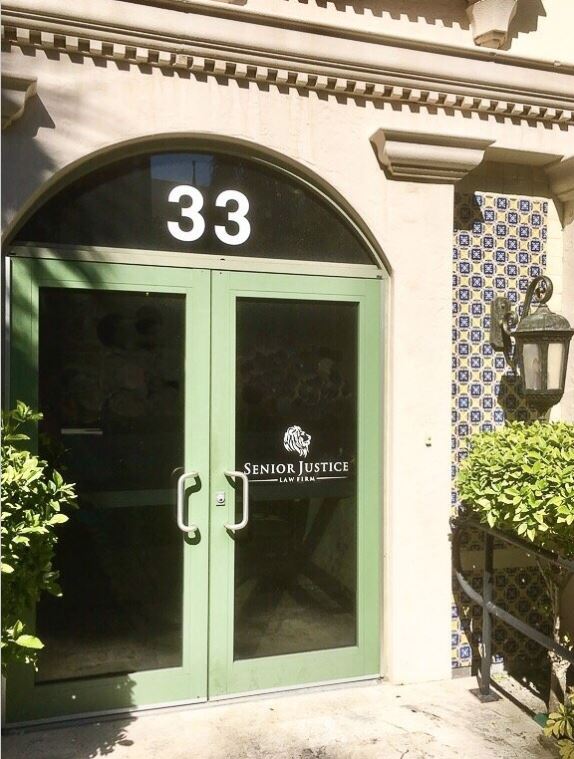
If your loved one was abused or neglected at a nursing home in California, our nursing home focused law firm can help. From San Diego to Del Norte County, Los Angeles to San Francisco, and everywhere in between, our attorneys are here to help your family achieve justice following abuse or neglect in a California nursing home or assisted living facility.
At Senior Justice Law Firm, our sole focus is on pursuing justice for wrongfully injured residents of nursing homes. This is all we do.
Let our years of experience pursuing justice for nursing home residents help your family get answers. We are available for a live chat or you can call us today to learn more about your legal rights following a nursing home injury in California.
Common Injuries and Types of Abuse in California Nursing Homes
Nursing home injuries can take many forms. However, some frequent injuries that result in lawsuits are bed sores, broken bones, weight loss, and wrongful death.
Falls
Falls are common among seniors and can be accidents. But if a patient is a known fall risk, they should receive proper supervision and support in the form of rails, alarms or pads, and any trip hazards should be removed from their living areas. Broken hips, femur fractures, subdural hematomas (brain bleeds) and other unexplained injuries can all result from falls in nursing homes. When our law firm investigates a nursing home fall case, unfortunately, more often than not we determine that the fall could have been prevented if the nursing home staff acted appropriately.
Bed Sores
Bed sores are serious injuries that are commonly seen in nursing home abuse cases. Bed sores are pressure ulcers on the skin that develop when a small area of the body is put under pressure for an extended time period. Patients with mobility issues are at an increased risk of suffering from bed sores. They are commonly found in areas with thin skin like the tailbone, buttocks, and heels, but can happen anywhere on the body. With proper attention, bed sores are treatable and highly preventable, but once they begin to progress they can quickly lead to life threatening conditions like MRSA, infections and sepsis. A deep bed sore should never form inside a healthcare facility. This is why bed sores are the most common injury type in California nursing home negligence litigation.
Dehydration and Weight Loss
Malnutrition and dehydration happens in nursing homes when the staff fails to attend to the specific dietary needs of its patients. While these conditions are dangerous enough on their own, improper assistance from caregivers during mealtimes can be potentially lethal as well, exposing vulnerable seniors to the risk of choking or aspiration pneumonia as food “goes down the wrong pipe” and into the lungs. If a resident loses more than 10% of their body weight or becomes severely dehydrated, it is likely that staff failed to assist them with nutrition and hydration. Failing to provide food or water to a vulnerable resident is a prime example of California elder abuse and neglect.
Sexual Abuse
Sexual abuse is another potential form of abuse that cannot be ignored in California’s nursing homes. The elderly often struggle with memory issues and general confusion, which can make them targets for sexual predators. Signs of sexual abuse to be aware of include withdrawal or anxiety related to certain parts of the body, the development of unexplained STDs, and bruising and bleeding or pain in the genitals, thighs or breasts. As with the victims of other forms of abuse, sexual abuse victims may feel too ashamed to admit what happened, may not remember it or may be simply unable to communicate what took place. Any form of rape inside a California nursing home must be reported and investigated immediately.
Physical Assault
Physical attacks should never occur inside a California healthcare facility. Many of our nursing home assault cases involve resident on resident violence. Some more shocking cases involve staff versus resident assault. Regardless of who perpetrated the violence, skilled nursing facilities are supposed to be safe places for our vulnerable family members. A nursing home assault or attack is inexcusable.
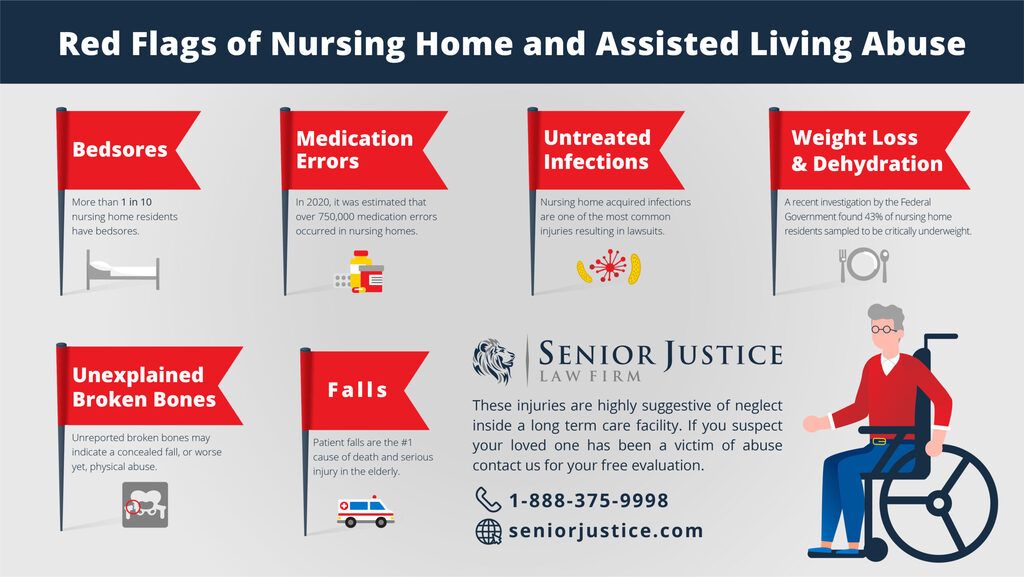
As the loved one or guardian of a nursing home resident, you must keep the potential for any of these scenarios in mind and know what to do if you witness any of the aforementioned “red flags” of abuse.
If your loved one unfortunately suffered any of the above red flag injuries inside a facility, contact our California nursing home abuse attorney today at 888-375-9998 to learn more about your legal rights.
Understanding Elder Care in California and Cases of Abuse
Contrary to the youthful appearances of Hollywood and Disneyland, the Golden State’s population is rapidly entering its golden years. In fact, projections estimate that by 2030 residents over age 60 will account for 25% of California’s population. As a result, the need for professional caregiving for age-related medical issues in California has never been higher.
Helping your elderly loved one transition into the professional care of a nursing home or in-home support specialist can help them maintain the quality of life they deserve. But sadly, as more of California’s seniors have become dependent on elder care facilities and services, the number of neglect and abuse cases in the state have risen as well. Legislators in Sacramento are wary of California’s staggering elder abuse issues, and have passed numerous legal protections which shield seniors from nursing home abuse and neglect.
As a family member or guardian of a senior citizen in California, it is important to understand the various types of elder care services available to your loved one, while also recognizing the realities of abuse and neglect that can take place. Doing so may help prevent your loved one from experiencing preventable injuries due to improper care. And if you do suspect suffering, abuse, or even wrongful death at a California nursing home, you need to know your rights and how to get justice. This page will provide you with the resources you need in order to do so.
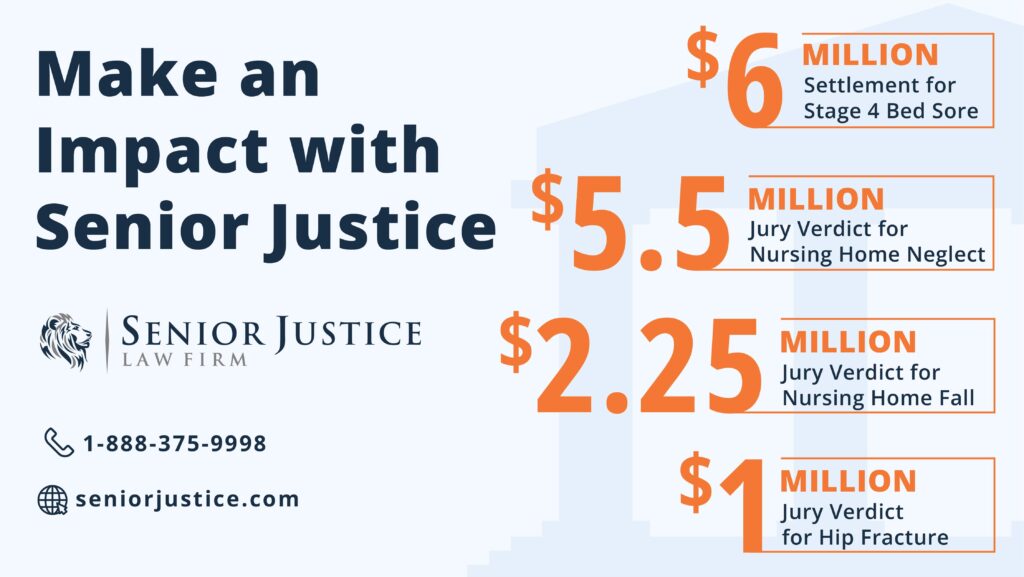
Elder Abuse Laws in California and Available Damages for Nursing Home Abuse Victims

The California Legislature has made it clear that its elderly residents deserve special consideration and protection under the law. The state has many elder abuse laws in place to protect the elderly from a wide range of crimes, from psychological trauma to financial exploitation to physical abuse, and each crime carries with it an associated penalty. For instance, California’s Penal Code Section 368 outlines varying degrees of elder abuse likely to produce great bodily harm or death. A misdemeanor under this code results in one year in county jail and/or a $6,000 fine, while a felony results in additional time in a state prison for five years or more.
The Elder Abuse and Dependent Adult Civil Protection Act (Elder Abuse Act) was enacted in 1982 and provides for both criminal and private civil enforcement of elder abuse laws. It was amended in 1991 to heighten the awards allowed for elderly victims of abuse in California’s nursing homes and other senior care facilities, including reasonable attorney’s fees and limited damages for pain and suffering.

This amendment to the Elder Abuse Act was a crucial development for California’s senior citizens in the fight against nursing home abuse because it significantly increased the total monetary amount that victims and their attorneys could seek in nursing home abuse cases. While the state previously capped non-economic damages at $250,000 for acts of professional or medical malpractice, the amendment enabled nursing home abuse victims to be relieved of this cap in certain circumstances of proven abuse or neglect.
Of course, financial retribution cannot undo the suffering unleashed by California nursing home negligence. But financial compensation is a uniquely effective way to punish abusive facilities and deter against future harm. This is because most nursing homes in California are owned and operated by for-profit organizations whose primary duty is to generate as much profit as possible for its shareholders. Abuse and neglect often occurs when optimal patient care does not align with maximum profitability.
The Elder Abuse Act was designed for use in the fight against facilities that fail to render the care their patients require, which is why having experienced California nursing home abuse attorneys on your side is essential if your loved one is ever subjected to such a crime.
How to Recognize Nursing Home Abuse or Neglect in California Facilities
Most nursing home abuse in California and throughout the rest of the country never actually gets reported. This is because not enough people understand what they should be looking for and what the most common signs of abuse are. You should always be on major changes in condition that can be indicators of nursing home abuse:
• Poor hygiene
• Unexplained weight loss (potential sign of malnourishment or dehydration)
• Missing personal belongings, money or credit cards (potential signs of financial abuse)
• Increased levels of anxiety, agitation or fear
• Unresponsiveness or listlessness
• Uncommunicative about care or individual(s) responsible for care
• New injuries or suspected injuries
As California’s elderly population rapidly grows and nursing homes continue filling up, nursing staffs in the state face increasing shortages and the concerning trend of being severely overworked. There is no doubt that these caregivers’ jobs are challenging, but negligence or abuse is never excusable. You can use the following sections to protect your loved one from such a scenario by getting educated on how common injuries occur, what they look like and how to report them if abuse is suspected. Our California nursing home abuse attorney can aide you in your quest for justice following a loved one’s wrongful injury inside a facility.
How to Report Elder Abuse in California
Aside from calling 911, which should be the first step if you believe your elderly loved one is facing an immediate health risk, you can report abuse to Adult Protective Services (APS). Each county in California has an APS unit that is dedicated to serving elderly and dependent adults. These units conduct investigations of reported abuse in nursing homes as well as private residences.
- Report elder abuse in Los Angeles
- Report nursing home abuse in the Bay Area / San Francisco – (415) 355-6700
- Report nursing home negligence in San Diego
- Report elder abuse in Sacramento – 916-874-9377
To report abuse to APS, you can call its 24-hour hotline at 1-833-401-0832, and enter your zip code to be connected to your county unit. APS also provides printable online forms for reporting suspected elder abuse. You can view and print the elder abuse reporting form here, which you can then send to your local county office. If you suspect financial abuse, APS provides a separate form to be used by financial institutions that can be found here.
Additional Nursing Home Abuse Reporting Resources in California
The Office of the State Long-Term Care Ombudsman (OSLTCO) provides free health and safety support services that are available to all California residents of long-term care facilities, regardless of age. The Ombudsman is intended to be an advocate for nursing home residents and others in similar care situations who tend to face common problems with how they are treated. All California long-term care facilities are required to post the phone number to the local Ombudsman office. To report a complaint of nursing home abuse or neglect to the Ombudsman’s statewide CRISISline 24-hour hotline, call: 1-800-231-4024. The office will review and investigate your complaint.
The Attorney General’s Division of Medi-Cal Fraud & Elder Abuse (DMFEA) investigates and prosecutes individuals that victimize California’s most vulnerable citizens, including the elderly. Pursuing justice against nursing home abuse and neglect is one of the main pillars of the Division. To report suspected Medi-Cal fraud or elder abuse to the DMFEA, you can call its 24-hour toll-free hotline: 1-800-722-0432 or complete its online complaint form.
The California Department of Public Health’s Licensing and Certification District Offices are responsible for reviewing and investigating complaints against healthcare facilities and providers in California, including nursing homes. The investigative authority of this department include complaints/reports of abuse, neglect, fraud, theft, working with an expired license and more. To file a complaint for investigation by the office, you can use its online form. Search for the facility by name in the web portal and submit as much information as possible about the suspected abuse.
You will not be penalized if your elder abuse complaint turns out to be invalid, as long as your report is provided in good faith with details you believe to be true. On the other hand, it is a crime in California to not report suspected elder abuse. An individual may be fined up to $5,000 and spend up to a year in jail if found guilty of not reporting suspected abuse.
If you are having trouble reporting elder abuse to the appropriate California state agency, our elder abuse lawyer can assist you. Call Senior Justice Law Firm today at 888-375-9998.
Inspections and Inadequate Care in California Nursing Homes
The California Department of Public Health Licensing and Certification Division inspects each of the state’s approximately 1,300 licensed nursing homes each year. Inspectors rate the facilities on a variety of patient wellbeing factors, and you can use Cal Health Find to search for the inspection histories of each nursing homes. The federal government’s Nursing Home Compare website also offers detailed quality of care and staffing information for every Medicare-certified nursing home in California and across the US. Both resources are good places to start when searching for the best care facility for your loved one.
Unfortunately, abuse and negligence is still possible at nursing homes with favorable overall ratings, so these websites should not be the only tool you use to select a nursing home for your loved one. If possible, visiting facilities in-person and seeking references from trusted friends or family members is always recommended.
California nursing homes vary widely in their ratings. Los Angeles, the state’s largest metropolitan area, is where many of the state’s worst rated nursing homes are located. There are other clusters of nursing homes with below average ratings in the San Francisco and Sacramento areas as well as isolated instances in more rural parts of the state.
Protecting California Nursing Home Residents from COVID-19 and How to Track Cases
While all of California’s elderly individuals face a heightened risk from COVID-19, those in nursing homes often face additional challenges as state facilities experience ongoing staffing shortages, a lack full-time Infection Preventionists and incomplete access to the resources needed to prevent the disease from spreading within their walls.
The California Department of Public Health’s Center for Health Care Quality (CHCQ) is working to protect nursing home residents in California from COVID-19. CHCQ developed six strategies focused on supporting nursing homes related to the issues of infection control and mitigation. The strategies are:
• Targeted COVID-19 testing and cohorting
• Expand statewide infection prevention resources
• Infection prevention education
• Quality and safety state survey model
• Mobile survey application
• Data management and predictive analytics
More information on each of these strategies can be found on the CHCQ COVID-19 webpage.
California releases COVID-19 data from the state’s nursing homes daily, and this data can be useful in gauging how effective CHCQ’s efforts are and identifying the specific nursing homes where seniors may be more at risk. The Los Angeles Times California Nursing Home COVID-19 Tracker compiles all this data each day and processes the information into charts and other illustrations that are easy to read. You can use the tool to see which areas of the state are current hotspots for the disease in nursing homes and even search for any facility by name to see its case and death counts among residents and staff.
Navigating California’s Elder Care Support Programs and Services
California’s elderly citizens often require and qualify for assistance with meals, transportation, personal care, medical issues and more. But the state’s elder care system can be confusing, which can prevent some seniors from taking advantage of the various offerings they are entitled to. Part of the problem is that no single government entity in California is responsible for age-related issues. This leaves California’s seniors and their caregivers responsible for navigating a patchwork of various resources to get the help they need. The following section is designed to help clarify some of the most essential resources available to California’s seniors and explain how you and your loved one can get the most value out of them.
Qualifying for Medi-Cal Coverage and Finding a Medi-Cal Certified Facility
California’s Medicaid program is called Medi-Cal, and it is governed by the Department of Health Care Services. Unlike the federal Medicare insurance program, which covers short-term care of 100 days or less in a nursing home, Medi-Cal is a need-based program that covers long-term care for seniors. California seniors aged 65 and older are eligible for Medi-Cal. More detailed information on Medi-Cal eligibility from the California Department of Health Care Services can be found here.
To get help from Medi-Cal in paying for nursing home care in California, your loved one must reside at a program-certified facility. To find Medi-Cal certified nursing homes, you can use the California Health Facilities Information Database (Cal Health Find) free online tool from the California Department of Public Health.
It is very important to remember that the cost of nursing home care adds up quickly, even for short stays. Most seniors tend to meet Medi-Cal’s financial eligibility requirements at some point during their stay, so it is generally a good idea to choose a Medi-Cal certified facility regardless of whether your loved one needs or qualifies for the program at the time they are admitted. Choosing an uncertified facility creates the risk of eviction when insurance or out-of-pocket money runs out, whereas Medi-Cal certified facilities cannot evict Medi-Cal eligible residents.
Elder Care for California Veterans
If your loved one is a veteran, elder care is handled by the Department of Veteran’s Affairs or CalVet, which operates its own nursing homes in California and has its own set of programs available exclusively for elderly vets.
In-Home Supportive Services and Other California Elder Care Resources
Tired of your loved one being exposed to the endless cycle of elder abuse inside California’s nursing home system? Avoid nursing home abuse by removing your parent from the facility and letting them age in place at home.
If a nursing home is not the right fit for your loved one but they would benefit from professional care, then you may opt for in-home supportive services. In California, the Department of Social Services oversees the state’s In-Home Supportive Services (IHSS) program, which covers home care for Medi-Cal eligible seniors and is administered individually by each county. IHSS helps California’s seniors safely reside in their own homes by taking care of daily chores such as meal prep, laundry and cleaning, as well as necessary travel accompaniment to doctor’s offices and other medical appointments. County social workers interview seniors at homes to determine their eligibility for IHSS and help assess the types of services they will need.
Finally, if you are a caregiver looking for more information on elder care in California, the Department of Aging administers a range of programs serving the state’s senior community and its nursing home residents. It can be a valuable resource for getting questions answered related to Medicare and Medi-Cal, finding senior healthcare recommendations and much more.
California Nursing Home News and Updates
The pandemic exposed many of California’s nursing homes for their blatant inability to care for their residents. To date, nearly 10,000 nursing home residents in the state have died of COVID-19. Lawmakers in the state can no longer ignore this ongoing catastrophe, and some are taking new measures to tighten licensing rules that have been too lenient in allowing incompetent facilities to remain operational.
In one example, the Los Angeles Times recently reported that an elderly resident died during a stay at Windsor Redding Care Center located in northern California. While the nursing home where the resident died was licensed by the state, it was not licensed under its owner at the time, Shlomo Rechnitz. Rechnitz was previously denied a license, citing at least one death and multiple cases of “serious harm” at other nursing homes that he owned or operated. However, Rechnitz was able to skirt the issue by forming a business partnership with one of the nursing home’s former owners who continues to hold the license. New legislative proposals aim to prevent this type of situation from reoccurring.
State assembly member Al Muratsuchi is one of the lawmakers proposing such changes. He authored Assembly Bill 1502 and recently stated, “In California, nursing home owners and operators can operate without a license even after they’ve been denied a license. Many of these owners and operators have, unfortunately, an extensive history of neglect and abuse.”
Clearly, California must do more to protect its elderly citizens as widespread abuse and neglect has carried on for far too long. Muratsuchi’s proposed bill is a step in the right direction, but for those who work to protect the state’s vulnerable seniors every day, the battle has only just begun.
Get Help Now from a California Nursing Home Abuse Attorney
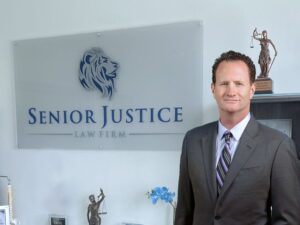
Speak with a California elder abuse attorney today to learn more about your legal rights following an injury or wrongful death inside a facility.
Attorney Jim Morgan has dedicated his professional legal practice to representing families impacted by nursing home negligence and elder abuse. Mr. Morgan has more than two decades of experience litigating cases against healthcare facilities. He accepts elder abuse cases statewide, including Los Angeles, San Diego, and the San Francisco Bay Area.
At Senior Justice Law Firm, we narrowly focus on claims against nursing homes and assisted living facilities. Let our niche experience in this specialized practice area help your family after a tragic event.
Receive a completely free California nursing home abuse attorney case evaluation now. Submit your case facts below, live chat with our office, or call us at 888-375-9998.

